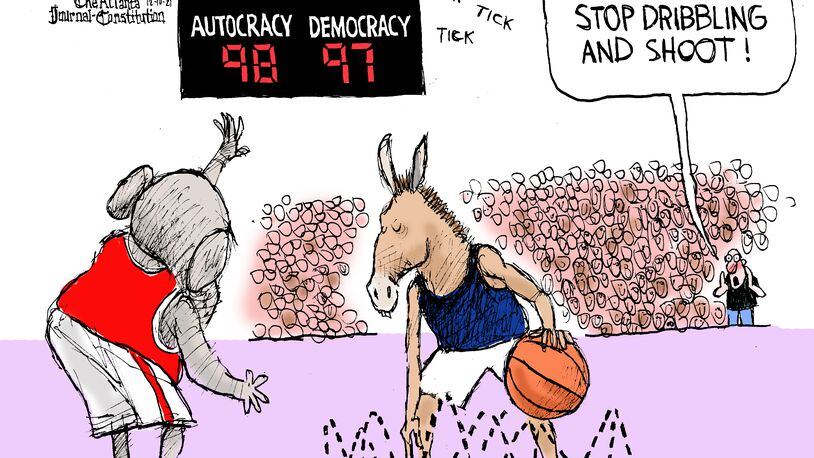If you don’t think this country is sliding toward theocracy, you’re not paying attention.
This week’s featured post is “Sweet Home, Gilead“.
This week everybody was talking about IVF in Alabama
The Alabama Supreme Court’s ruling that frozen embryos are children for the purposes of wrongful death lawsuits is covered in the featured post.
Just after I pushed the Post button, I saw that Jay Kuo had written about his personal IVF story. His IVF child is currently in a surrogate mother’s womb. (Since I subscribed to Kuo’s substack blog, I’ve been linking to it almost every week.) He includes a photo of a frozen embryo, so we know what we’re talking about.

The bottom line is that the GOP can’t support IVF and support the idea that an embryo is a “person” entitled to full protection under our laws. Supporting IVF means understanding how it actually works and being comfortable with the idea that intended parents must create more embryos than we ultimately need. And clinics cannot be on the hook for murder should anything happen to them. No clinic coul survive with that threat hanging over it.
Neither of those two principles can be truly supported by Republicans so long as their party adheres dogmatically to the “life begins at conception” notion. Politicians who claim to support IVF must repudiate these kinds of fetal personhood laws, or their public backing of IVF means exactly nothing.
In my post, I tried not to treat the Alabama court’s position with all the contempt it deserves, so I resisted the temptation to include the “Every Sperm is Sacred” scene from Monty Python’s The Meaning of Life.
In other religious-right news: The campaign to overturn the Obergefell same-sex marriage decision begins in Tennessee, with a law allowing state officials to refuse to solemnize same-sex marriages.
This law wouldn’t block same-sex marriages, because same-sex couples could still get a marriage license and find somebody other than a judge or other government official to play the celebrant role. But it does relegate them to a second-class status, which this Supreme Court will probably think is fine. This is exactly the kind of chipping-away that states did on Roe v Wade until it was reversed.
Personally, I judge these things by applying a racial analogy: What if a judge refused to marry an interracial couple to express his personal disapproval? Of course, Justice Alito is unmoved by this analogy. Recently he wrote that his dissent in Obergefell was prescient in foreseeing
that Americans who do not hide their adherence to traditional religious beliefs about homosexual conduct will be ‘labeled as bigots and treated as such’ by the government.
Of course, if you want to deny the full rights of citizenship to people your religion disapproves of, and you believe that government officials should be able to treat them with official disrespect, you are a bigot. Conservative political correctness may not let people say so, but it’s not even a close call.
and Russia, Russia, Russia

Last week we learned that the Biden impeachment case — which had always been flimsy — had fallen completely apart: The star witness for the bribery story Republicans wanted to tell, Alexander Smirnov, had been indicted for making the whole thing up and lying to the FBI. Another prospective witness, Gal Luft, had been indicted last summer for arms trafficking and being an unregistered Chinese agent.
This week we found out it’s worse than that: Smirnov now says he got his anti-Biden stories from Russian intelligence.
Jay Kuo (him again) lays out the pipeline by which Russian disinformation found its way to the Trump Justice Department and from there to Republicans in Congress (Jim Jordan, James Comer, Chuck Grassley) who pushed it out to the country.
These GOP leaders are at best hapless dupes. They should have known and understood the games Russia was playing with them. But we shouldn’t discount the possibility that they were well aware that the Smirnov claims were false and may have originated from Russian intelligence… and then went along with them anyway.
Indeed, we should now actively investigate this possibility.
In a members-only newsletter on TPM, Josh Marshall wonders if the mainstream press is up to covering this story.
Donald Trump and his MAGA legions have spent years shock-training reporters not to bring up anything else about Russian disinformation programs aimed at helping Donald Trump. But they’re real. They’re continuing. They’re actually working. And that remains the case no matter how many times Donald Trump says “RUSSIA RUSSIA RUSSIA” on Truth Social. Reporters have been conditioned to ignore the clear implications of what we’re learning.
So what does he think the real story is?
[W]e now see that almost all of 2023 was dominated by a legal/political story that was not only bogus but — according to prosecutors’ filings and the discredited source’s own admission to federal authorities — was a plant by the Russian intelligence services. That’s real. That requires an explanation as to how that was ever allowed to happen.
… The story here isn’t that the “Biden Crime Family” nonsense didn’t pan out. That was always transparently bogus. The story here is how the U.S. again got bamboozled by transparent foreign manipulation and how the U.S. political press bought into it pretty much whole hog. That doesn’t mean they accepted all the claims. But they treated it as reasonable, worthy of a presumption of seriousness, a serious story to be covered as such. Even with the veritable forest of red flags.
and the Trump trials
Judge Engoron officially filed his judgment against Trump Friday, with the disgorgement-plus-interest standing at $454 million. This sets the clock running: Trump has 30 days to appeal. But appealing doesn’t mean he gets to delay coming up with a substantial amount of money.
Trump has two options to meet the state’s demand: to pay the amount in full, or secure a $35m bond against his assets, which might include the Fifth Avenue Trump Tower, 40 Wall Street, his Mar-a-Lago estate, or a number of golf courses in the US.

The WaPo examines the difficulties Trump faces raising cash.
“If the guy can give phony financial statements, he can give phony information to the bonding company,” [attorney Mark C.] Zauderer said, referring to Engoron’s finding in the case that the Trump Organization submitted false information to banks to obtain loans. “A bonding company who is going to put up several hundred million dollars here is not, in my opinion, going to do it easily.”
Those Carroll and NY state totals face very different prospects on appeal. The Carroll money is mostly punitive damages, which was a judgment call made by the jury; an appeals court might make its own judgment and find that excessive. But the NY State money is based on disgorgement of specific ill-gotten gains. To reduce them, an appeals court would need to rejudge Engoron’s conclusions: It would have to find either that Trump did not commit fraud, or that the fraud was not connected to these particular gains.
I’m not going to put a lot of effort into making fun of Trump’s branded sneakers, because it’s shooting fish in a barrel. But I will pass on one nickname they have picked up: Aryan Jordans. And one suggested slogan I heard: “Fast. Faster. Fascist.”

and media malpractice

I already mentioned Josh Marshall’s doubts that the mainstream media is up to covering the Smirnov story. But that’s just part of a much larger failing.
This week, a new Quinnipiac poll had Biden ahead of Trump 49%-45%. So of course Politico’s headline was “Poll: Nearly 70 percent of voters say Biden is too old to serve again“. There’s no such thing as good news for Biden.
Jeff Tiedrich recalls “the Clinton rules”
basically, Bill or Hillary would do something that every other politician in the entire history of the world does — something as simple as holding a fundraiser, or giving a speech — and the press would report it in hushed tones and describe it as if it were some new kind of dastardly scandal.
Well, the same thing is happening with Biden: Whatever he does — even if every other politician in the world does it — is evidence that he’s too old. Tiedrich links to The Daily Mail, which has discovered the latest evidence of Biden’s senility: He uses note cards!
Mark Jacobs raises a significant question about the NYT: “Is the New York Times neutral on the future of democracy?” He calls out all the doubts I have about whether the Times deserves my subscription: They regularly give a platform to known liars. They cover politics as “an amusing game”, analyzing everything as strategy without discussing the consequences. They write headlines that hide horrible things Republicans say (like when Trump’s “vermin” comment was simply “a very different direction” for a Veterans Day speech). And they find “balance” for every terrible thing Republicans do. (Trump is facing criminal charges? He encourages Putin to invade our allies? Yeah, but Biden is old. Biden’s age is filling the same “balancing” role that Hillary’s emails played in 2016.)
The Times’ best work is very, very good. But I continue to wonder whether it’s a net positive or negative for American journalism. One change you may have noticed on this blog: I used to subtly encourage my readers to subscribe, but I no longer do. So I’m only linking to NYT articles if there is something unique about them. If I can get the same information from The Guardian or CNN, I will.
The New York Times Pitchbot suggests an angle for the Times to take in the future:
Given the fact that Trump and Biden have 91 felony counts between them, it’s no wonder that so many Americans are considering voting third party.
Last week I linked to Ezra Klein’s call for Biden not to run, and for the Democrats to hold an open convention. This week many people pushed back on that idea. Lindsay Beyerstein called attention to Biden’s success at unifying the divergent wings of the Democratic Party, and predicted that party unity would dissolve in an open convention.
In 2024, a contested convention would become an arena to settle every score from Gaza to Medicare for All. A free-for-all would shatter the fragile Democratic coalition that Joe Biden so carefully knit together.
Several pundits made the same observation: No alternative candidate is doing better than Biden in the polls against Trump. (Current polls show the race more-or-less even.) You can claim that’s a name-recognition problem and they’ll do better after they’re nominated, but that’s a leap of faith.
Josh Marshall writes:
The right answer to anyone making these kinds of open-ended statements of concern is to say, tell me specifically what course of action you’re advocating and, if it’s switching to a new candidate, how you get there in the next few weeks? … Klein’s argument really amounts to a highly pessimistic but not unreasonable analysis of the present situation which he resolves with what amounts to a deus ex machina plot twist. That’s not a plan. It’s a recipe for paralysis.
and the wars
As Israel prepares its ground operation against Rafah (the southern-Gaza town where refugees have gathered), it still has no goal beyond the vague and unachievable “destroy Hamas”. For an analysis of how everything arrived at this state, I recommend Zack Beauchamp’s Vox article “How Israel’s War Went Wrong“.
In The New Yorker, a Palestinian who escaped to Egypt describes how the relatives he left behind are scrambling for food.
Biden continues to back away from Netanyahu very, very slowly. Friday, the administration restored a legal finding the Trump administration had reversed, saying that the West Bank settlements are against international law.
Tomorrow’s Michigan primary will be a test of how much Biden’s Israel policy is costing him, as Palestinian activists are campaigning for Democrats to vote “uncommitted” rather than for Biden.
We just passed the two-year anniversary of Russia’s invasion of Ukraine. PBS Newshour gathered some experts to summarize.
My two-years-in observation is about the politics of the Ukraine War in the US: It resembles the politics of January 6. At the beginning, Americans responded the way human beings would. They sympathized with a country trying to get out of the orbit of Putin’s fascist Russia when Putin’s forces invaded to pull them back in. (I’ve since read all kinds of explanations about how either Ukraine or the West provoked Russia, and I just don’t see it. There was never a threat to invade Russia through Ukraine. Anything less is a problem for diplomacy, not justification for an invasion. The typical answer to that point is to bring up the US invasion of Iraq, which was also unprovoked. But I have no trouble admitting that the Iraq invasion was wrong too.)
That initial gut response wasn’t controversial in America. In the early days of the war, everybody, regardless of political party, was rooting for the underdog Ukrainians and wondering what we could do to help. That’s how the situation was similar to January 6: In the beginning, everybody who wasn’t actively involved in the coup reacted with horror to Trump’s brownshirts attacking the Capitol to try to keep him in power by force. Kevin McCarthy, Mitch McConnell, and just about the whole GOP establishment united with Democrats in their initial rejection of what Trump had done.
But then the MAGA media machine and the MAGA social-media conspiracy theorists got to work on reversing the natural human instincts of the people under their sway, and today both Ukraine and January 6 are partisan issues.
and the dysfunctional House of Representatives

Ukraine aid isn’t the only thing House Republicans are stalling. Speaker Johnson has recessed the House until Wednesday, with a partial government shutdown looming Friday and the rest of the government running out of money a week later. The WaPo reports that “talks have slowed” on a compromise to prevent a shutdown.
The four appropriations bills set to expire Friday — agriculture; military construction-VA; energy and water and transportation; housing and urban development — are the easier ones. On March 8, funding runs out for more controversial bills for which the far right is demanding even more explosive policy riders around abortion, LGBTQ rights and border security.
and you also might be interested in …
South Carolina’s Republican primary was Saturday, and Trump won over Haley, 59%-39%. How you read that result depends on the question you’re asking. If you’re focused on whether Trump will be nominated, this is a very solid positive result. If Haley is 20 points down in her home state, she really has no chance.
But if your question is whether Trump will be able to unite the Republican voters in the fall, this is a weak showing. Voters went in knowing Trump was the almost certain nominee, but 39% refused to get in line behind him.
Democracy is returning to Wisconsin. For many years, the Wisconsin legislature has been gerrymandered to guarantee Republican control, independent of the will of the voters. AP reports that Democrats have won 14 of the last 17 statewide elections, but somehow those same elections have yielded a Republican supermajority (22-10) in the state senate and a near supermajority (64-35) in the state assembly.
Nonetheless, the voters of Wisconsin still had access to a few levers of power. Last April, Janet Protasiewicz won a 55%-44% victory to gain a seat on the state supreme court, flipping the court to liberal control. In December, the court ruled 4-3 to throw out the Republican-drawn legislative maps. Forced to negotiate with Democratic Governor Tony Evers (another winner of a statewide election), the Republican legislature produced a relatively fair map, which Evers signed into law last Monday.
The Milwaukee Journal Sentinel reports:
Under the new state Assembly map, the districts are more evenly split. The new map has 46 districts that lean Republican and 45 districts that lean Democratic. The eight districts left are likely to be a toss-up between Democratic and Republican candidates. …
Under the new state Senate map, 14 out of 33 districts are Democratic-leaning, while 15 are Republican-leaning. Four districts are competitive, where either party has a fair chance of winning them.
However, the Wisconsin congressional maps are still gerrymandered, and Republicans hold six of the eight seats. Democratic voters are packed into the other two districts (containing Madison and Milwaukee), which they won by 19 and 25 points.
The NYT reports on “The Crisis in Teaching Constitutional Law“. What’s the crisis? The clearly partisan nature of the current conservative supermajority on the Supreme Court. The older generation of professors once shared a faith that interpreting the Constitution is a meaningful activity transcending politics. Justices might have philosophical differences that lead to diverse conclusions, but fundamentally they are all making a good-faith attempt to understand what the law means. Recent Supreme Court decisions — like the Bruen gun control decision — have shaken that faith, to the point that law professors don’t know what to teach their students.
Whatever rationale or methodology the justices apply in a given case, the result virtually always aligns with the policy priorities of the modern Republican Party. …
Stanford’s Professor McConnell recalled a recent exchange in one of his classes. “I said something to the effect of, ‘It’s important to assume that the people you disagree with are speaking in good faith.’ And a student raises his hand and he asks, ‘Why? Why should we assume that people on the other side are acting in good faith?’ This was not a crazy person; this was a perfectly sober-minded, rational student. And I think the question was sincere. And I think that’s kind of shocking. I do think that some of the underlying assumptions of how a civil society operates can no longer be assumed.”
I don’t know how many times I’ve heard that “the stock market always goes up in the long run”. Well, sometimes the long run is a very long time indeed. If you bought Japanese stocks at their peak in 1989, you finally turned a profit this week.
and let’s close with some musical training
I’ve heard lots of versions of Pachebel’s Canon, but never before one based on train whistles.








:quality(70)/cloudfront-us-east-1.images.arcpublishing.com/tronc/ZMSZJEBRNZDERGIVUQPHE3KY7A.jpg)












